An overland tour to Victoria Falls is the ideal opportunity to immerse yourself in wild and dramatic landscapes. Along the way, visit Chobe, Makgadikgadi and Tuli, all in 10 days from Gauteng. Here’s a doable itinerary for an iconic road trip. By Romi Boom
How many bucket list ticks can you fit in one 10-day overlanding trip? Follow our suggested route and you’ll not only get to marvel at Vic Falls, but take a sunset boat cruise and enjoy game sightings galore. This itinerary starts from Johannesburg.
For guidance on tackling a motorbike journey to the falls from the Mother City, view this Cape Town to Victoria Falls video by Craig Marshall.
Day 1: Serowe
The Khama Rhino Sanctuary, 30km northeast of Serowe, is a favourite overnight stop on the way to Botswana’s interior. The sanctuary was established in 1992 to protect the remainder of the country’s black and white rhinos. The large campsites are shaded; if you arrive late and tired, there are also self-catering bungalows. Keep an eye open for mammals around your tent and have the binoculars on hand, there are more than 230 bird species.
Time permitting, it is well worth spending an extra night or two here. Book an early morning rhino tracking safari or hire a guide to accompany you in your vehicle for a two-hour game drive.
Day 2 and 3: Chobe National Park
It’s a long drive today, but the excitement mounts as you near Chobe National Park. The park itself has very limited accommodation for campers: just one campsite, Ihaha, which should be booked long in advance. (There are also two expensive upmarket lodges in the park.) Ihaha unfenced camp is basic but it has a fantastic setting right on the riverfront, reached through heavy sand. This is where we had one of the most awesome evening braais ever, being totally surrounded by a massive herd of buffalo slowly grazing their way to the waterside. There was absolutely no movement from the humans, hardly any breathing and a vastly accelerated heart rate! If you’ve left it too late for Ihaha, there are various options in town along the Chobe riverfront section. The park is unfenced so you may well see wildlife in lodge grounds. Crocodiles and hippos abound along the river, take care.
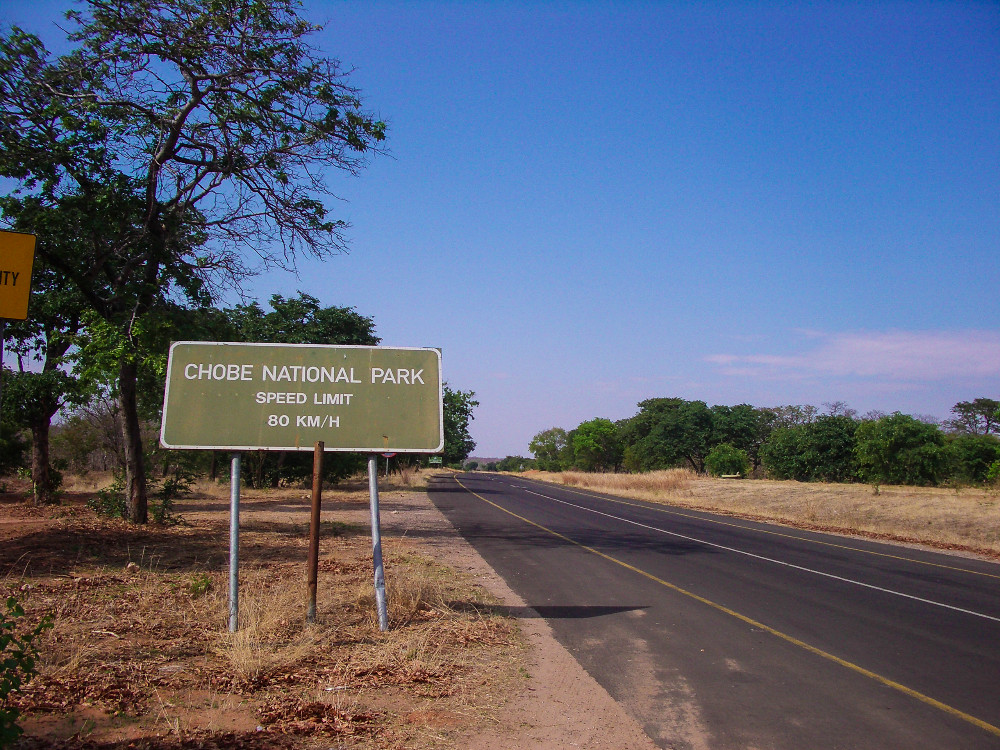
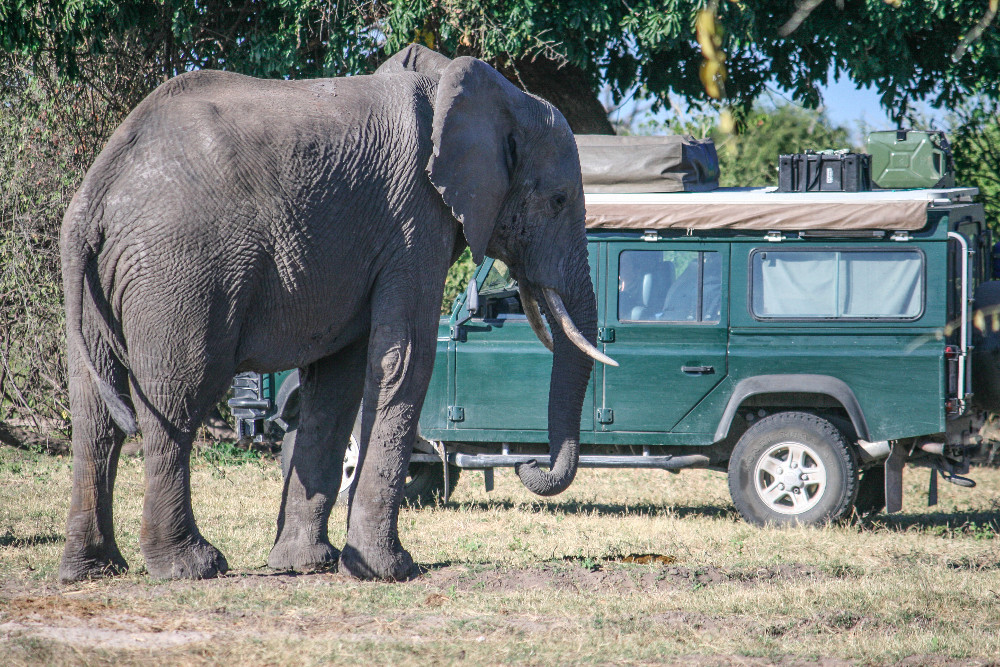
Day 4: Kasane
Kasane is a tourism hub with a range of accommodation and good shopping facilities, as well being as a convenient base for day trips and special tours of the park.
In the morning, a self-drive game drive is highly recommended, both along the riverside and in the inland section. Enter from Sedudu Gate on the B8 tar road that bisects the park. Before 9am safari vehicles get preferential entry; self-drivers have to wait their turn.
Sightings of elephant and buffalo are not uncommon and you may find yourself stuck for ages on a narrow track. Best to have some appropriate reading matter, such as Veronica Roodt’s Trees and Shrubs of the Okavango Delta. This kept us occupied for a good 40 minutes while we waited for the ellies (the highest concentration in the world is found here) to make way.
In the afternoon, a sunset boat cruise is a must-do. Book through your Kasane accommodation venue. As well as being utterly relaxing, being on the water is the most rewarding way to approach the wildlife as they feed on the sweet grass on the islands.
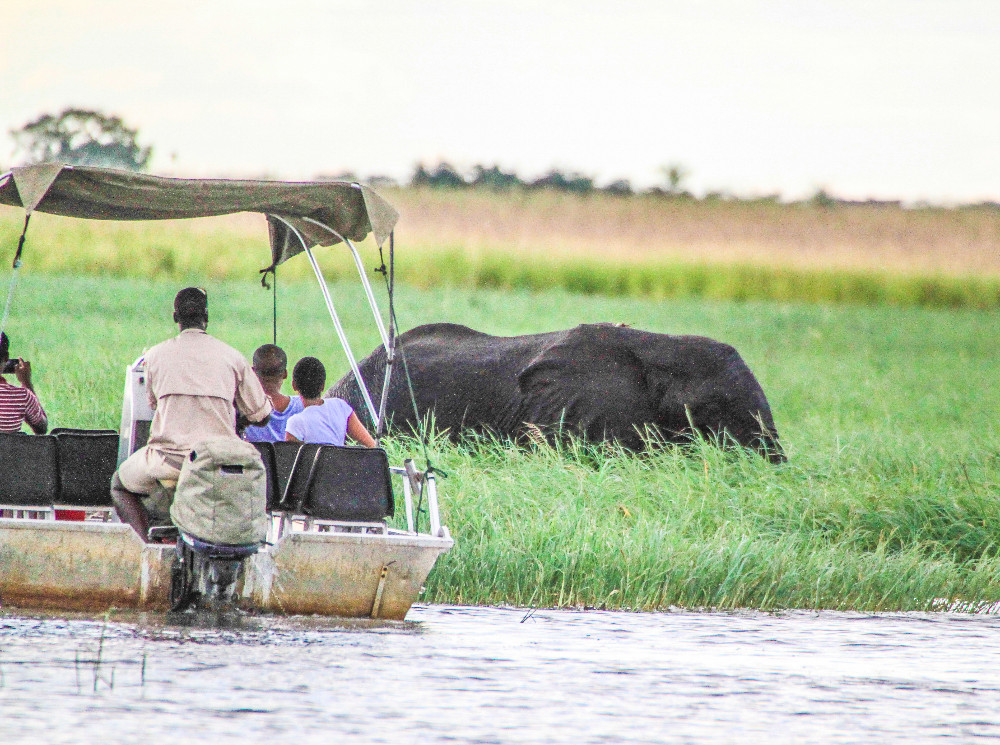
Day 5: Victoria Falls
Because of the costs and time involved in crossing the border with a vehicle, many travellers opt for an organised day trip to Vic Falls. There are various operators running day tours from Kasane to the Zimbabwean side: they’ll pick you up from your accommodation in the morning and you’ll return in the late afternoon.
T4A tip: Two reliable operators are Shearwater Adventures and Wild Horizons.
If you prefer travelling under your own steam, you can opt to view the falls from either Zimbabwe or Zambia. Travellers heading into Zambia should extend their stay to explore one or more of their fantastic game parks.
Also read: Explore the best of Zambia
There’s plenty to do at Victoria Falls, known by Zambians as Mosi-Oa-Tunya – The Smoke That Thunders. At 1,7 kilometres wide, the world’s largest waterfall is one of the Seven Wonders of the World, a UNESCO World Heritage Site. Adventure activities include helicopter flips (Zimbabwe & Zambia), scenic flights in a microlight (Zambia) and hiking trails such as the famous Knife’s Edge bridge (Zambia).
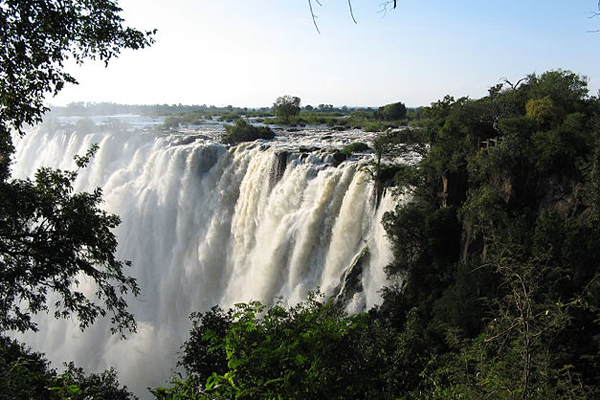
T4A tip: The largest section of Victoria Falls can be found on the Zimbabwean side, with the Eastern Cataract on the Zambian side. While it’s recommended to view Vic Falls from Zimbabwe, Zambia is where you’ll find Devil’s Pool and Livingstone Island. Visits to these are great activities but note that they can only be done during low-water conditions.
Day 6: South to Nata
The main road south from Kasane to Nata is also known as the ‘game drive route’, as there is a good chance to see wildlife along the way. North of Pandamatenga, we’ve regularly seen elephants and even giraffe; keep an eye open for impala, steenbok, on occasion buffalo and sable.
Allow time for a pit stop at the iconic Elephant Sands bush lodge and campsite; if you’re in luck, the ellies will come to drink a couple of metres away from you at the natural waterhole right in front of the lodge.
If you have a few more days, you can access Hwange National Park from the border post at Pandamatenga.
Day 7: Makgadigadi Pans
Nata is a grubby crossroads town but Nata Lodge, about 10 km further along towards Francistown, is a good base to check out Makgadikgadi – the largest area of salt pans in the world. A day trip takes you to the pans dotted with palm islands and includes a visit to the Nata Bird Sanctuary on Sua Pan, a community project on the northern edge of the pans. After the first summer rains, the sanctuary can be surprisingly rewarding with 200 species having been recorded, sometimes flamingoes and pelicans. At the lodge, the tree canopy and water feature attract a feathered spectacle and at night, bushbabies.
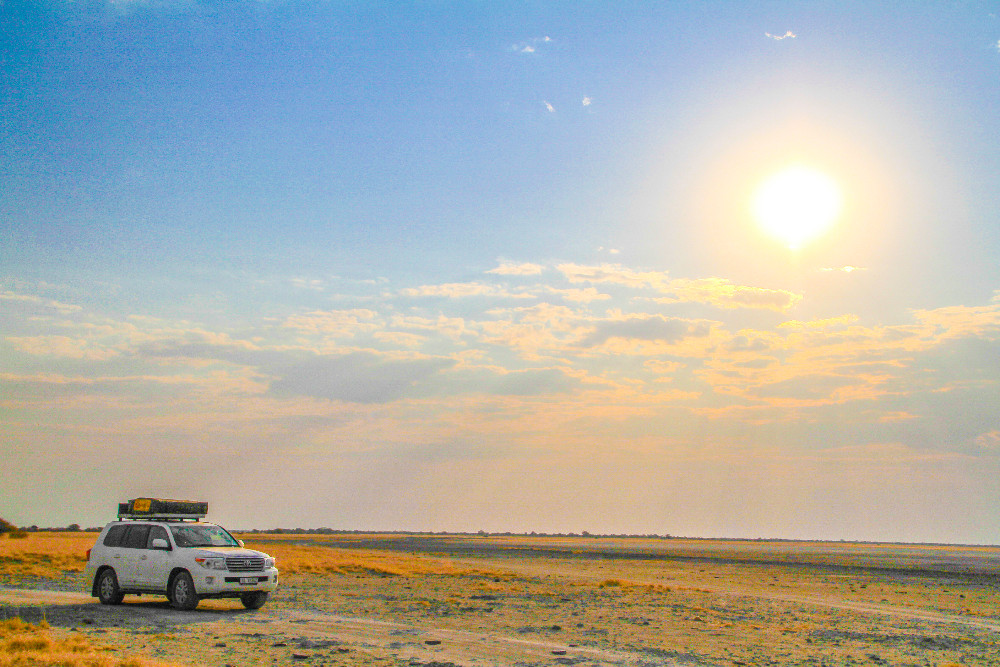
Also read: An expert’s guide to the Makgadikgadi Pans
Day 8: Tuli Block
The Tuli Block, besides being the largest privately-owned game conservation area in southern Africa, boasts spectacular landscapes with panoramic vistas, amazing topography and crystal clear night skies. Known as the ‘Land Of The Giants’, or the ‘Hardeveld’, the most distinguishing features of the conservancy are its ancient baobab trees and rock formations carved from ancient granite and basalt. Wildlife sightings are particularly good due to the abundance of animals and birds (over 350 species) combined with a lack of thick vegetation. On the private game reserves, only guests have access to the game drive areas, and guided night drives are possible – think Pel’s fishing owl…
Day 9: Tuli Block
For first-timers it makes sense to get a feel for the lie of the land by splitting your two nights’ accommodation. We first camped at Stevensford, a private game reserve, and then at African Ranches River Camp on a working farm; both have large shaded campsites on the banks of the Limpopo with massive nyalaberry and leadwood trees as well as outstanding ablutions. Driving northwest, on a good gravel road en route to Mashatu and the Pont Drift border post, you’ll ogle at the awesome Solomon’s Wall, 30-metre high basalt cliffs, when crossing the dry bed of the Motloutse River (the first alluvial diamonds in Botswana were found upstream in the Motloutse).
T4A tip: When driving through the Tuli Block, take care to stay on the main transit road. There might not be any fences here, but travellers are definitely not allowed to turn off onto a side road for a quick game drive.
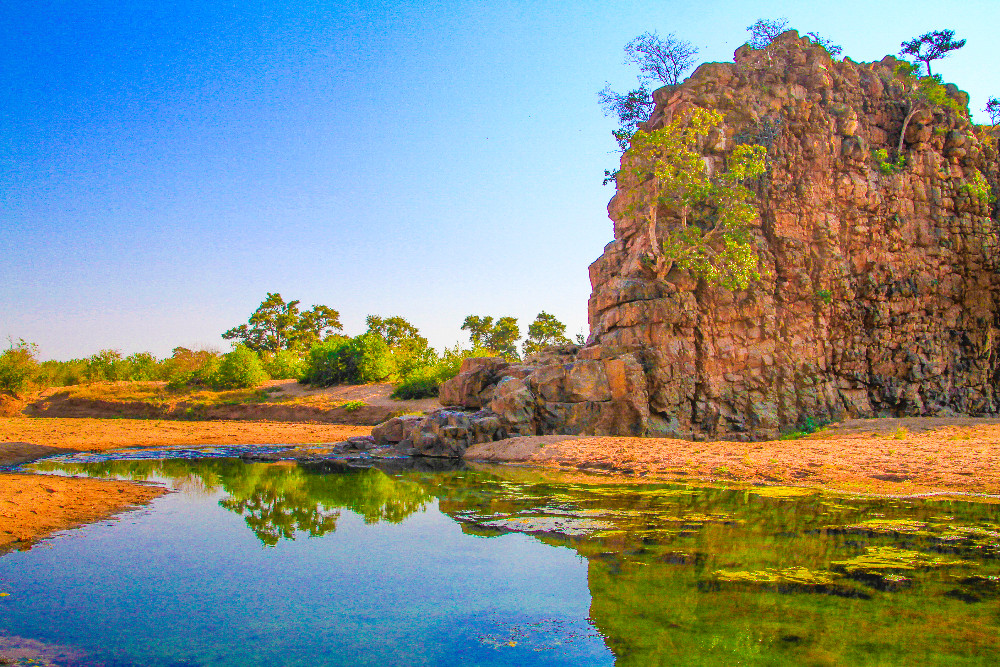
Day 10: Home
Onward and homeward after a unique safari.
Suggested route
| Day 1 | Johannesburg | Serowe, Khama Rhino Sanctuary, BOTSWANA | 615km |
| Day 2 | Serowe | Chobe, BOTSWANA | 660km |
| Day 3 | Chobe | Chobe, BOTSWANA | 0km |
| Day 4 | Chobe | Kasane, Chobe, sunset cruise, BOTSWANA | 50km |
| Day 5 | Kasane | Victoria Falls day trip, ZIMBABWE | 0km |
| Day 6 | Kasane | Nata, BOTSWANA | 375km |
| Day 7 | Nata | Nata, Makgadigadi Pans, BOTSWANA | 30km |
| Day 8 | Nata | Tuli Block, BOTSWANA | 500km |
| Day 9 | Tuli Block | Tuli Block, BOTSWANA | 40km |
| Day 10 | Tuli Block | Johannesburg, SOUTH AFRICA | 600km |
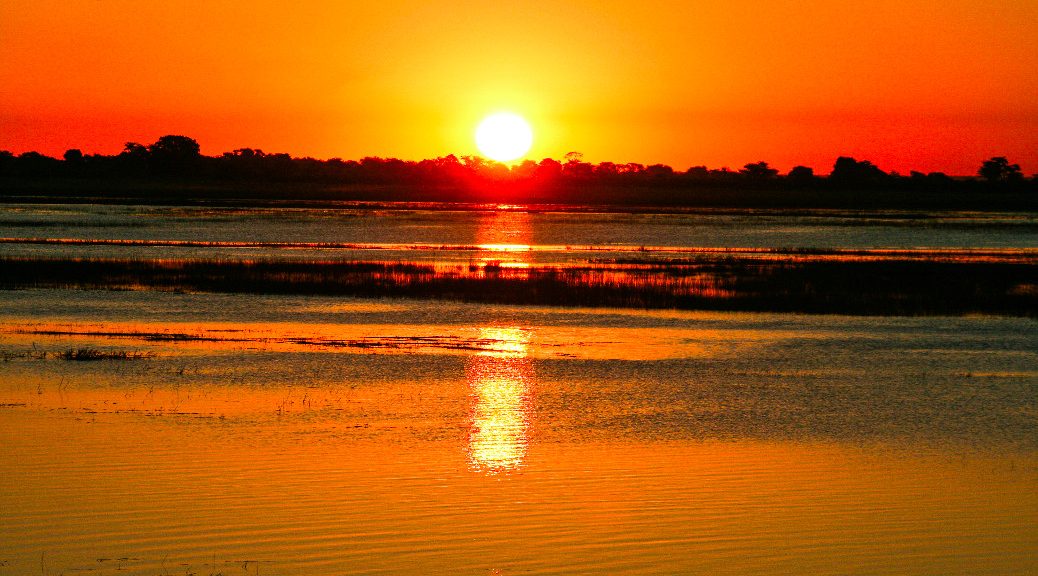

Where is the map of the route? So useful to show a map when discussing a trip.